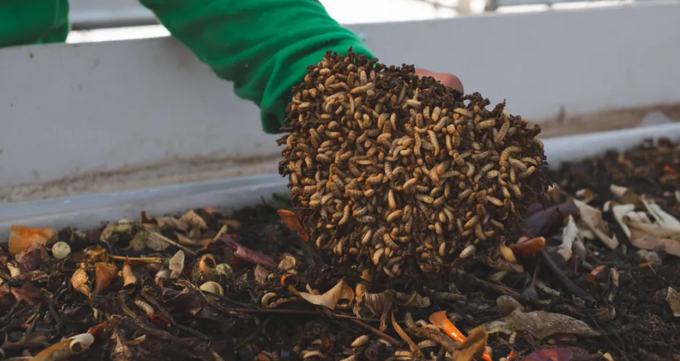October 18, 2025 | 22:11 GMT +7
October 18, 2025 | 22:11 GMT +7
Hotline: 0913.378.918
October 18, 2025 | 22:11 GMT +7
Hotline: 0913.378.918

Despite its benefits, though, frass isn’t widely used yet.
While they might not win any beauty contests, the black soldier fly larvae (BSFL) are making a massive impact by turning food waste into a nutrient-rich biofertilizer known as frass. No, I’m not joking. Bug poop might just save the world, in a manner of speaking.
Roughly one-third of the planet’s soil is degraded. That means traditional farming methods are straining under the weight of chemical fertilizers to compensate for this degradation. As such, scientists have been on the hunt for new eco-friendly solutions that won’t worsen our fight against climate change.
Enter BSFL. These tiny bugs can consume almost any type of organic waste, from food scraps to agricultural byproducts. But they don’t just nibble. Researchers say they devour waste, munching through up to four times their body weight in waste every single day.
In comparison, traditional composting often takes up to 10 months or longer to recycle the same amount of waste. That’s a pretty big difference. And, combined with other advancements in soil—like the smart soil that can grow crops with less water—frass could be a good opportunity to improve how farmers work their fields.
But the real magic happens after the black soldier fly larvae have had their feast. That’s because the larvae leave behind something scientists call frass. This nutrient-packed byproduct acts as a natural fertilizer and is brimming with the components plants love and need to survive—like nitrogen, phosphorus, and other beneficial microbes.
And, unlike synthetic fertilizers that degrade soil health over time, frass boosts soil biodiversity and can even improve water retention. Further, because of the various microbes it is packed with, researchers say it could even help crops build natural resistance to pests and diseases.
The US Department of Agriculture (USDA) has wasted no time in calling on these tiny little waste eaters, either. The agency recently awarded grants to several companies that are pursuing new frontiers in BSFL farming. The model here is relatively simple, too. Local farms supply food waste to feed the larvae; in return, they get frass to enrich their soil.
Despite its benefits, though, frass isn’t widely used yet. Regulatory hurdles remain, and the US National Organic Program isn’t willing to fully embrace insect-based fertilizers. Plus, there’s the whole thing with public perception—convincing people that bug poop is the next big thing in farming isn’t exactly an easy sell despite traditional fertilizers utilizing animal poop for thousands of years.
But, as fertilizer costs continue to soar and climate concerns grow, BSFL could offer a low-cost, eco-friendly alternative. Reports say farmers who have tested frass on their crops have reported faster growth, healthier plants, and improved soil. All that’s left to do now is topple the market that big fertilizer has spent decades building.
BGR

(VAN) Government should prioritize national budget allocations and ODA to support the targeted development of rural clean water systems, ensuring equitable access for all rural communities.

(VAN) IFAD’s support has helped scale up lessons from the local level to national policies, promote inter-provincial cooperation, and facilitate knowledge exchange within the region.

(VAN) The establishment of the Bac Hai Van Landscape Protected Area aims to preserve natural landscape values, develop forest environmental services, reduce greenhouse gas emissions.

(VAN) Deputy Director Luong Van Anh affirmed that this is not only an inevitable requirement of the times but also a key solution for building sustainable and modern rural areas.

(VAN) Bach Long Vi Island, known as the 'raw gem,' is gradually being polished to become a highlight in the nation’s development, balancing sustainable marine economic growth with biodiversity conservation.

(VAN) Developing circular ruminant livestock farming is an effective approach for Can Tho to utilize resources, reduce emissions, and prevent diseases.

(VAN) In 2025, coffee, cashew nuts, rice, seafood, and fruits and vegetables will be products with the greatest breakthrough potential, thanks to international market demand and the country's orientation toward developing high-quality, sustainable products.